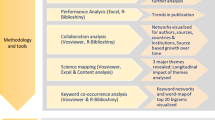Abstract
The complexity and dynamicity of interdisciplinary research clusters requires an efficient management in order to ensure a good performance. Therefore, this paper presents an iterative regulatory process for managing interdisciplinary research clusters which has been implemented at the two clusters of excellence at RWTH Aachen University. Thereby, an annual evaluation of the cluster performance through a cluster-specific employee survey forms the basis for the derivation and implementation of different measures. By evaluating the performance again, the loop of organizational learning starts anew. As one example of these measures, the colloquia of employees are described in further details because the adaptation and optimization of concepts illustrate the effects of the continuous improvement. Furthermore, the general performance development of the cluster was analyzed to show the comprehensive effects of the regulatory process.
Access this chapter
Tax calculation will be finalised at checkout
Purchases are for personal use only
Similar content being viewed by others
Notes
- 1.
- 2.
- 3.
Interdisciplinary research which is conducted together with non-scientific organizations is often called transdisciplinary [8]. Because in this study, only the researchers are objective of study, the term interdisciplinary is used.
- 4.
- 5.
- 6.
In CoE 1 has 66 % and in CoE 2 84.7 % of the actors are research assistances.
- 7.
The variations result from the steadily decreasing participation rate from 60.5 % in 2009 to 30.0 % in 2014.
References
J. Mittelstraß, Methodische Transdisziplinarität. Technologiefolgenabschätzung – Theorie und Praxis 2 (14), 2005, pp. 18–23. https://www.tatup-journal.de/tatup052_mitt05a.php
N. Academies, Facilitating Interdisciplinary Research. The National Academies Press, Washington, DC, 2005. http://www.nap.edu/catalog/11153/facilitating-interdisciplinary-research
M.M. Millar, Interdisciplinary research and the early career: The effect of interdisciplinary dissertation research on career placement and publication productivity of doctoral graduates in the sciences. Research Policy 42 (5), 2013, pp. 1152–1164. doi:10.1016/j.respol.2013.02.004. http://www.sciencedirect.com/science/article/pii/S0048733313000401
B. Alecke, G. Untiedt, Zur Förderung von Clustern. ,,Heilsbringer” oder ,,Wolf im Schafspelz”? GEFRA, Münster, 2005. http://doku.iab.de/veranstaltungen/2005/gfr_2005_alecke_ untiedt.pdf
M. Sondermann, D. Simon, A.M. Scholz, S. Hornbostel, Die Exzellenzinitiative: Beobachtungen aus der Implementierungsphase. No. 5 In: iFQ-Working paper. 2008. http://www.bildungsserver.de/db/mlesen.html?Id=42076
R. Häußling, Grenzen von Netzwerken, 1st edn. VS Verlag für Sozialwissenschaften, Wiesbaden, 2009
C. Boardman, D. Gray, The new science and engineering management: cooperative research centers as government policies, industry strategies, and organizations. The Journal of Technology Transfer 35 (5), 2010, pp. 445–459. doi:10.1007/s10961-010-9162-y. http://link.springer.com/article/10.1007/s10961-010-9162-y
R. Defila, A. DiGiulio, Interdisziplinarität und Disziplinarität. In: Zwischen den Fächern - über den Dingen?, Leske u. Budrich, Opladen, 1998, pp. 111–137. http://sowiport.gesis.org/search/id/gesis-solis-00231872/Cite
C. Brecher, Integrative Production Technology for High-Wage Countries, 1st edn. Springer, Berlin, 2012
Cluster of Excellence Tailor-Made Fuels from Biomass/Maßgeschneiderte Kraftstoffe aus Biomasse: Informationsmaterial. http://www.fuelcenter.rwth-aachen.de/index.php?id=341
C. Pohl, G. Hadorn, Methodenentwicklung in der transdisziplinären Forschung. In: Transdisziplinäre Forschung: Integrative Forschungsprozesse verstehen und bewerten, ed. by M. Bergmann, E. Schramm, Campus Verlag, Frankfurt/New York, 2008, pp. 69–93
C. Jooß, F. Welter, A. Richert, S. Jeschke, C. Brecher, A Management approach for interdisciplinary Research networks in a knowledge-based Society – Case study of the cluster of Excellence “Integrative Production technology for high-wage countries”. ICERI2010 Proceedings, 2010, pp. 138–143. http://library.iated.org/view/JOOSS2010AMA
C. Jooß, Gestaltung von Kooperationsprozessen interdisziplinärer Forschungsnetzwerke, 1st edn. Books on Demand, Norderstedt, 2014
J. Sydow, S. Duschek, Management interorganisationaler Beziehungen; Netzwerke - Cluster - Allianzen, 1st edn. Kohlhammer, Stuttgart, 2011
P. Pawlowsky, Betriebliche Qualifikationsstrategien und organisationales Lernen. In: Managementforschung, vol. 2, ed. by W. Staehle, P. Conrad, DeGruyter, Berlin, 1992, pp. 177–238
C. Argyris, D.A. Schon, Organizational Learning: A Theory of Action Perspective. Addison Wesley Longman Publishing Co, Reading, MA, 1978
B. Liebsch, Phänomen Organisationales Lernen: Kompendium der Theorien individuellen, sozialen und organisationalen Lernens sowie interorganisationalen Lernens in Netzwerken, 1st edn. Hampp, München, 2011
A. Neely, Measuring Business Performance. Bloomberg Press, London, 1998
C. Jansen, Scorecard für die Wissensmanagement-Performance in heterogenen Unternehmensnetzwerken, Meß-, Steuerungs- und Regelungstechnik, vol. 1024. VDI, Düsseldorf, 2003
P. Horváth, M. Seiter, Performance Measurement. In: Die Betriebswirtschaft, no. 3 In: 69, 2009, pp. 393–414
F. Welter, R. Vossen, A. Richert, I. Isenhardt, Network Management for Clusters of Excellence - A Balanced-Scorecard Approach as a Performance Measurement Tool. In: Automation, Communication and Cybernetics in Science and Engineering 2009/2010, ed. by S. Jeschke, I. Isenhardt, K. Henning, Springer Berlin Heidelberg, 2011, pp. 195–207. http://link.springer.com/chapter/10.1007/978-3-642-16208-4_17
F. Welter, Regelung wissenschaftlicher Exzellenzcluster mittels scorecardbasierter Performancemessung, 1st edn. Books on Demand, 2013
R.S. Kaplan, D. Norton, The Balanced Scorecard: Measures that Drive Performance. Harvard Business Review 70 (1), 1992, pp. 71–79. http://www.hbs.edu/faculty/Pages/item.aspx?num=9161
D.D.F.a. Wissenschaftsrat, Bericht der Gemeinsamen Kommission zur Exzellenzinitiative an die Gemeinsame Wissenschaftskonferenz. Bonn, 2008. http://www.wissenschaftsrat.de/download/archiv/exini_GWK-Bericht-%5B1%5D.pdf
D.D. Forschungsgemeinschaft, 1. Ausschreibung in der Exzellenzinitiative: Auswahl der Antragsteller. Bewertungskriterien für die 3. Förderlinie. Köln, 2006. https://www.google.de/search?q=1.+Ausschreibung+in+der+Exzellenz-+initiative:+Auswahl+der+Antragsteller&ie=utf-8&oe=utf-8&gws_rd=cr&ei=mH5PVbHEEoa9swGhqICYBA
L. Gratton, T.J. Erickson, 8 ways to build collaborative teams. Harvard Business Review 85 (11), pp. 100–109, 153
Acknowledgments
The authors would like to thank the German Research Foundation DFG for the kind support within the Clusters of Excellence “Integrative Production Technology for High-Wage Countries” and “Tailor-Made Fuels from Biomass” at RWTH Aachen University.
Author information
Authors and Affiliations
Corresponding author
Editor information
Editors and Affiliations
Rights and permissions
Copyright information
© 2016 Springer International Publishing Switzerland
About this chapter
Cite this chapter
Müller, S.L. et al. (2016). Managing Interdisciplinary Research Clusters. In: Jeschke, S., Isenhardt, I., Hees, F., Henning, K. (eds) Automation, Communication and Cybernetics in Science and Engineering 2015/2016. Springer, Cham. https://doi.org/10.1007/978-3-319-42620-4_11
Download citation
DOI: https://doi.org/10.1007/978-3-319-42620-4_11
Published:
Publisher Name: Springer, Cham
Print ISBN: 978-3-319-42619-8
Online ISBN: 978-3-319-42620-4
eBook Packages: Mathematics and StatisticsMathematics and Statistics (R0)




